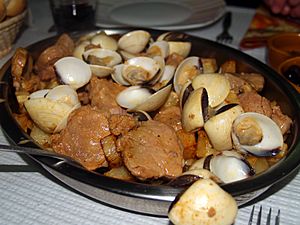Carne de porco à alentejana facts for kids
Carne de Porco à Alentejana is a super popular and traditional dish from Portugal. Its name means "Pork Alentejo Style." It's a special meal that mixes two main ingredients: tasty pork and fresh clams. People usually serve it with crispy potatoes and a sprinkle of fresh coriander.
This dish starts with about 800 grams of pork. The pork is first marinated, which means it soaks in a special mix of white wine, paprika, red pepper paste, chopped garlic, coriander, bay leaf, salt, and white pepper. Sometimes, especially in northern Portugal, a spice called cumin is also added. After marinating, the pork is fried until it turns a lovely golden brown. Then, the clams are added and cooked until they open up. Traditionally, this delicious meal is served with cubed potato fries or baked potatoes.
Where Did It Come From?
The exact origin of Carne de Porco à Alentejana is a bit of a mystery! Some people think it comes from the Alentejo region of Portugal, which is where the name comes from. But others believe it actually started in the Algarve, a region closer to the sea.
Alentejo vs. Algarve
The main reason for this debate is the clams. Clams are seafood, and they are much more common and popular in towns right by the ocean. The Alentejo region, however, is mostly inland, far from the sea. It only has one larger fishing port, Sines, and a few small fishing villages along its coast. The food in most of Alentejo is usually based on meat, not seafood.
The Algarve, on the other hand, is a coastal region known for its amazing seafood. So, it makes sense that a dish with clams might come from there.
A Mix of Flavors
Carne de Porco à Alentejana might be a great example of what we call fusion cuisine. Fusion cuisine is when you mix cooking styles and ingredients from different places or cultures. In this case, it could be a mix of the pork dishes that are popular in inland Alentejo and the seafood dishes that are famous in coastal Algarve. This blend creates a unique and delicious flavor that has become a favorite all over Portugal!
See also
 In Spanish: Carne de porco à alentejana para niños
In Spanish: Carne de porco à alentejana para niños
 | Emma Amos |
 | Edward Mitchell Bannister |
 | Larry D. Alexander |
 | Ernie Barnes |


